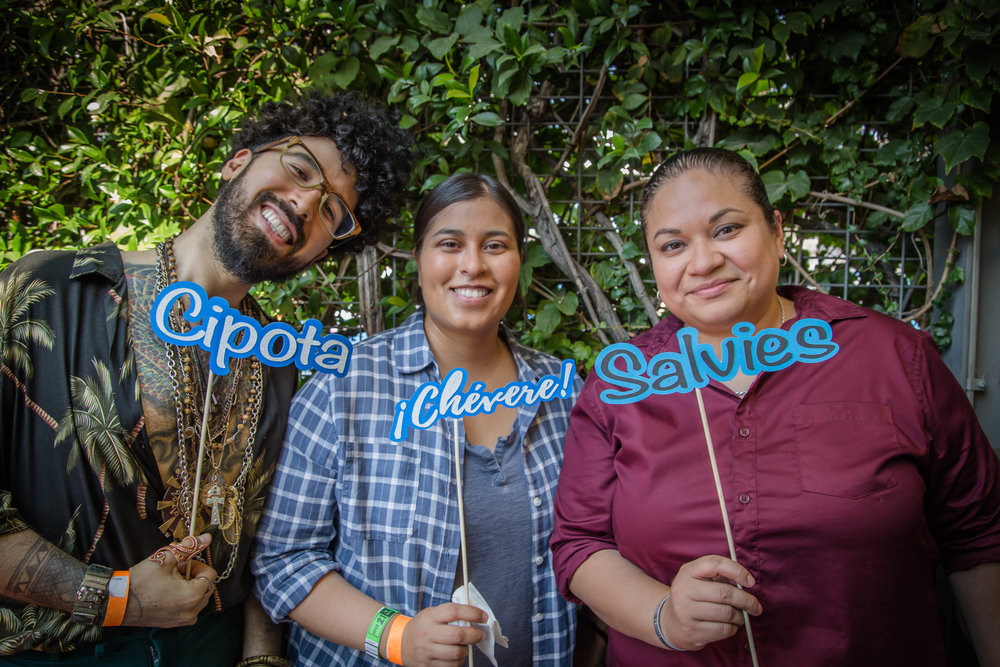[dropcap size=big]I[/dropcap]f you’ve ever been to a fiesta Latina, you might’ve noticed that the matriarca usually eats last. She spends the bulk of the evening making sure everyone is fed, comfortable and satisfied. When the dust has settled, you might find her in a corner, eating a cold plate of carne asada, exhausted but content. That’s how I found Cynthia Gonzalez about an hour after her inaugural ¡Chévere! event had ended, only with a plate of pupusas and a Corona. It was her first meal of the day.
“This is just the beginning, setting the foundation, connecting each one of us,” Gonzalez said. “We’re all little unicorns, but we’re here. It’s just that we don’t know about each other.”
Happiness and pupusas aplenty defined the vibe on one recent boiling-hot afternoon at The Village at Ed Gould Plaza, for the first-ever ¡Chévere! The event was hosted by Salvies Who Lunch, a new networking platform that aims to empower the Salvadoran community by highlighting role models. The group was founded by Gonzalez, who is operations manager for Lil’ Libros, as well as a culture writer and poet.
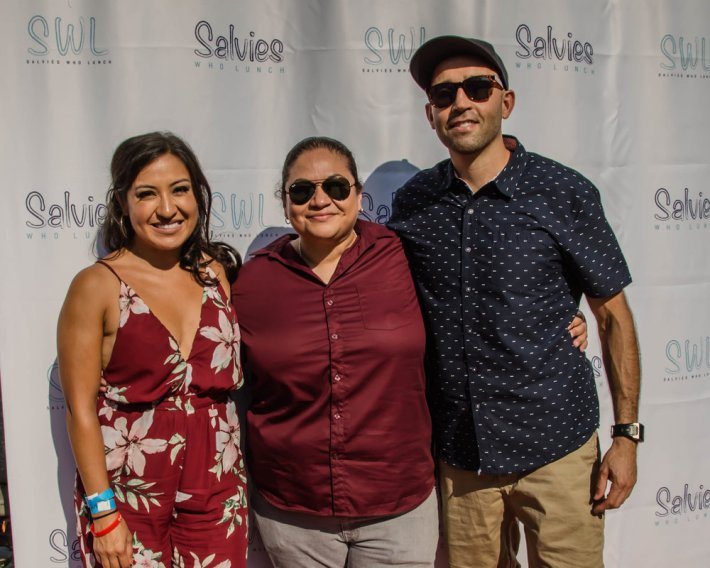
L.A. Salvadoran
[dropcap size=big]A[/dropcap] tour of all eleven tables presenting the work of Salvadoran entrepreneurs revealed a culture born not in El Salvador, but in Los Angeles. Of the 20 to 30 percent of Salvadorans who fled the civil war during the 1980s, many of them found home in L.A., where they now make up the second-largest foreign-born cohort.
Born and raised in Southern California, I grew up relating to the Salvadoran diaspora, the children of brave, hard-working Salvadoran refugees, more than El Salvador itself. And what I saw at ¡Chévere! was that diaspora claiming a space in the fabric of Los Angeles, as if to say, “We are here, and we are not going anywhere.”
I saw a culture rooted in nostalgia for a place long gone, and a hope for an even better future.
RELATED: Radio Pulgarcito: Exploring Salvadoran Culture and Identity Through Vinyl
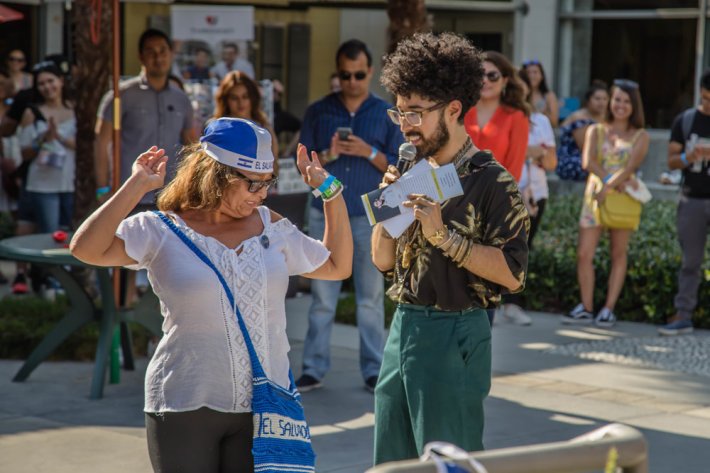
Oh Comadre’s soy candles with scents like Agua de Mango y Piña and Vicky’s Vapo Candle reminded me of my mother, her fresh juices, and the healing balm she rubbed into my chest when I was child. And so did Candy’s Kloset, with its display of dainty gold-toned and silver-toned name plate bracelets, reminiscent of the kinds Latina moms buy their babies.
On the plates, however, instead of one’s carefully engraved name, were words like chillona, chismosa, or chingona.
Some work struck me as distinctly Californian, like Art of Fernie, whose art included a concha designed in the style of The Misfits logo – “Conchfits.” The artist, Fernie Menjivar, said he got the idea one morning while eating a concha and listening to The Misfits. Maitri Healing Co. featured organic skin care products made “with crystal infusions, holistic intention and affirmations of happiness, love, and empowerment with sage/palo santo cleansing.”
It wouldn’t be a Salvi celebration without some pupusas, and at ¡Chévere! you could get them from La Pupusa Urban Eatery. The pupuseria, originally located in Pico Union, had a flair that set it apart from more traditional restaurants.
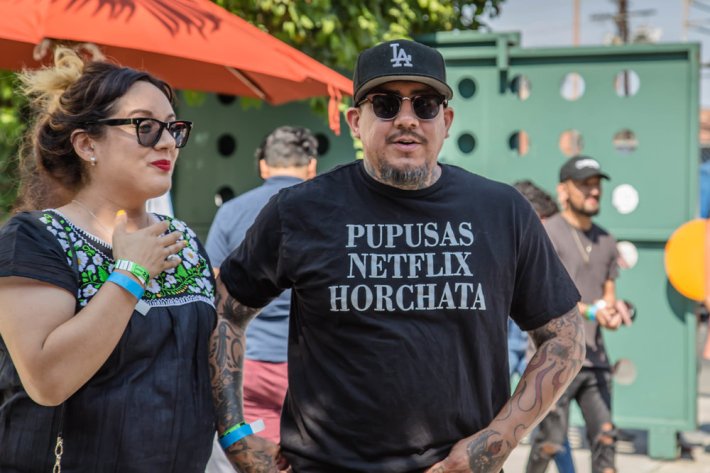
Gonzalez was born in El Salvador and raised in South Los Angeles. She has that chispa I witness often in Salvadoran women. She is an accomplished author and cultural engineer, so it’s no wonder that Salvies Who Lunch was born from a hashtag she used on Instagram when she was eating pupusas with her Salvi friends.
Ariana Stein, co-founder of Lil’ Libros, a bilingual children’s book publishing company, knew about Cynthia’s passion for her Salvadoran roots, so she motivated her to use the hashtag to engage her community.
“She was like, ‘Just do it!’ and so I went ahead and thought, ‘I’m going to do this,’” Gonzalez recalled. “‘I don’t know what I’m doing, but I’m going to do something.’”
She started by using Instagram to highlight local educators and artists, fun facts about El Salvador, and recent Salvadoran college graduates. Before she knew it, Curly reached out to her and volunteered his support, and people were beginning to ask, “So when’s the next event?”
Then ¡Chévere! was born.
RELATED: Meet the L.A. Chef Who Has Veganized 40 Dishes From El Salvador and Is Going For More
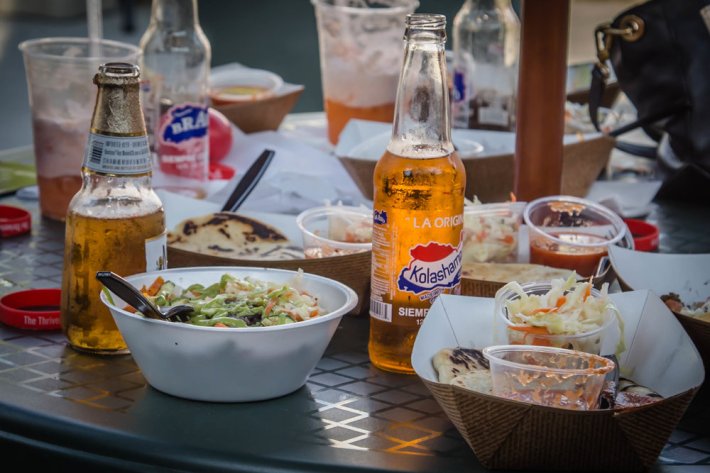
Pupusa Party
[dropcap size=big]A[/dropcap]longside classic options like pupusas revueltas and pan con pollo, they offered fusion dishes like La Mexicana – a pupusa topped with meat protein, pico de gallo, guacamole, sour cream, and cotija cheese – reflecting the influence L.A. Mexican culture has had on Salvadoran immigrants. There was also De Colores – a bowl filled with hearty Salvadoran ingredients like casamiento, curtido, chimol, as well as mixed greens, stir fry veggies and avocado, a clear effort to adapt to the growing vegan culture in Latin communities.
For dessert, Twisted for Sugar offered gourmet cotton candy flavors that only Salvadorans could truly appreciate, like Cola Champagne and horchata.
While the event was naturally lighthearted, it didn’t ignore a certain heaviness and sense of responsibility that comes with being Salvadoran American.
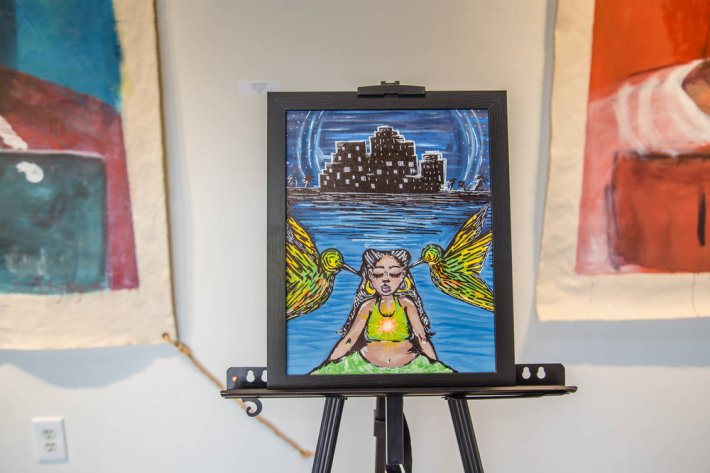
Artwork of five Salvadoran artists – La Colocha, Lah Roxy, Jennyfer Medina, Felix F. Quintana and Carlos Rogel – revealed the complex identities Salvadorans tend to grapple with, and the many kinds of beauty and pain that come with being part of a diaspora.
A resource table promoting non-profit organization AFJA was a reminder that a big part of being from a diaspora is finding ways to serve the motherland. USC grad Steven Cruz founded the soccer academy, which now has over 70 boys and girls, in the Salvadoran neighborhood he played soccer at as a child. AFJA has been working with local communities and partnering with other non-profits to provide them soccer gear, a better education, and clean water.
RELATED: Salvadoran L.A. Stands Up for Temporary Protected Status
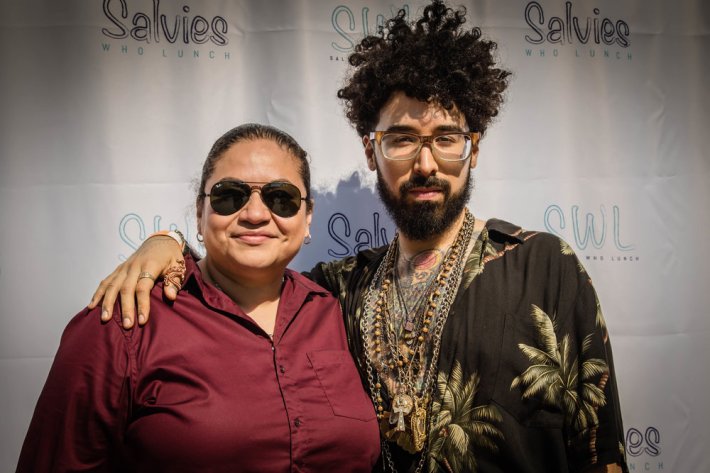
[dropcap size=big]T[/dropcap]he event was hosted by Curly Velazquez, lead creator for BuzzFeed’s Pero Like channel. Performances included spoken word poetry by L.A. Taco resident poet Astrid and live-singing by Nira. The whole afternoon was stimulated by DJ Rod who played music any Salvadoran could recognize. The kind we’ve been dancing to at every family party for as long as we can remember.
In the future, Gonzalez plans on executing panel discussions, workshops, art exhibits, children’s and all age events. The Los Angeles LGBT Center has already offered their 200-seat theater at the Village, so film festivals, music, and art shows are also in Salvies Who Lunch’s future.
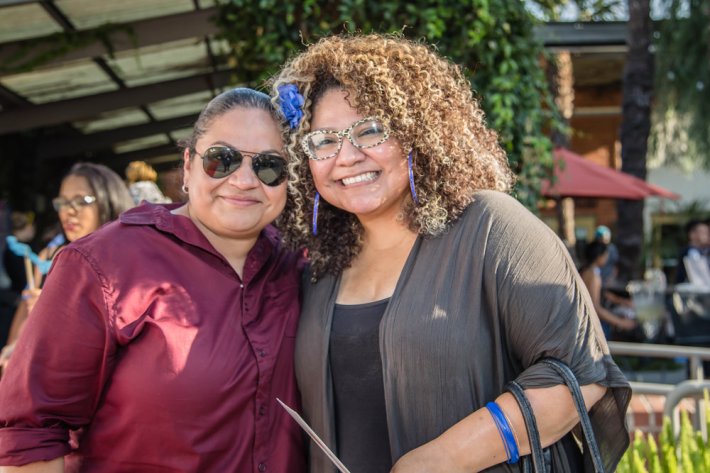
But Gonzalez knows that in order to make her visions come true, she needs to create a bigger network. “Thank you to each one of you for being here, for making this first event so successful, so beautiful,” Gonzalez told the crowd to finish the party. “Because if you see around you, next to you ... We’re brown. We’re beautiful. We’re definitely hot! But we are happy.”
Stephanie, a 25-year-old Salvadoran woman from South L.A. told L.A. Taco that she grew up a bit disconnected from her roots.
“Growing up, all of my friends were Mexican, so it was not until my adulthood that I started to interact with more Salvadorans, Central American people in general. It’s just really nice to share this experience with people who know your culture, know your food, you know? It just feels like at home.”
RELATED: Read the L.A. Taco Poetry section, curated and written by Astrid.
